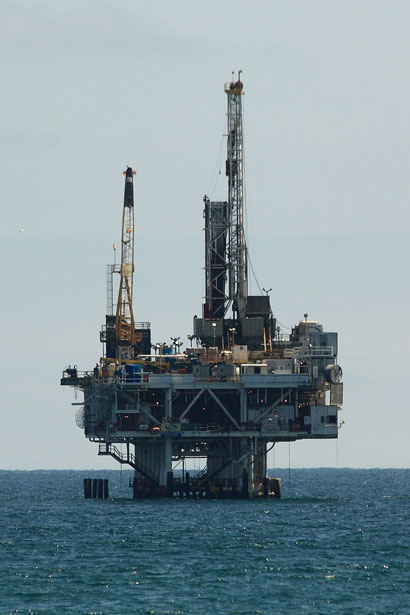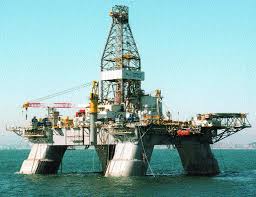10/12/2012 Offshore Operators
 |
Photo by Andrew Schmitt http://www.publicdomainpictures.net/view-image.php?image=7554&picture=oil-drilling-platform
OFFSHORE DRILLING CONTRACTORS ARE NOW MOSTLY FOREIGN CORPORATIONS
It didn't Start Out That Way But If Senator McCain Has His Way It Will Remain That Way. Follow The Money.
The famous "BP OIL SPILL IN THE GULF OF MEXICO" was obviously the product of BP AKA British Petroleum, the holder of the then U.S. Minerals Management Service offshore lease. When most people think of offshore oil development they think in terms of "bottom founded" artificial islands like the one depicted in the Andrew Schmitt photo above. But in fact much of the new offshore exploration and even production work is done from Mobile Off Shore Drilling (or production) Units (MODUS).
 |
This "MODU" is actually a vessel. The "legs are really "cassions" that connect to "sponsons " or pontoon like hulls under the water. The center of buoyancy is below the wave action and the waves pass through the leg like "cassions" producing very little motion. These "rigs" work in water far too deep for building platforms. These are vessels. This type of vessel was invented by Texas offshore operators and were first built in the United States.
Obviously the BP oil disaster was brought to our Gulf Coast by British Petroleum a foreign oil company which held the lease and hired the various contractors to develop it. The contractors however, were as Congressional hearing would demonstrate foreign corporations some with long histories in Texas and American sounding names but headquartered in Switzerland. The MODUs involved and the over whelming majority of working MODUs on the Gulf Coast today are built and registered in foreign countries, usually "open registry states", generally with very lax safety enforcement programs. How did this happen. Representative Gene Taylor (D- Mississippi) was able to squeeze out the answer from one of the witnesses in the Congressional hearing. It seems that a number of drilling contractors that originally pioneered the MODU concept made fortunes on the U.S. Outer Continental Shelf Lands (OCS). Then in order to avoid U.S. Taxes and costs reorganized as foreign corporations , often Swiss. Then they built the next generation of MODUs in places like Korea. The only thing keeping them off of our OCS was the Jones Act. They applied for exceptions because"there weren't enough U.S. flag MODUs to meet the need. Of course there weren't because that's how they planned it. The supposed watch dogs over the OCS the USCG which admits to not knowing a moon pool from a drill collar simply affirmed to Congress that yes there was a shortage. The Customs Service which apparently doesn't know port from starboard seconded the motion . One witness reluctantly admitted that it had over 50 MODUS on the U.S. OCS and not one was registered in America. The company was originally founded in Houston, Texas.
The Congressional subcommittees overseeing the Coast Guard appeared angry at the end of the BP hearings and determined to reverse this contrived situation in violation by plan of the Jones Act. But so far there has been little action to return MODU building and ownership to the United States. Now these big Modus like the earlier legged rigs need lots of logistic support from offshore service vessels (OSVs). These little ships journey from coastal ports in the United States to platforms or MODUs in our OCS waters , a domestic move even more clearly protected by the Jones Act than the MODU activity. We have dozens of operating companies working such vessels and thousands of these OSVs. You can see a number of OSVs in the foreground of this picture of the BP rig afire.

It was discovered in the course of the Congressional hearings on the BP disaster that some companies were either gaining legal exceptions or illegally bringing in foreign flag OSVs to support some of these foreign flag MODUs in violation of the Jones Act and offering head to head competition with U.S. OSV operators. At lest verbally one of the Coast Guard congressional subcommittees "ordered the USCG to eliminate all foreign OSVs from the U.S. OCS within two years. There has been no visible movement in that direction. What is pictured above is highly predictable when the Jones Act is ignored because the entire purpose in ignoring the Jones Act is escaping U.S. regulation. Why would U.S. Senators and representatives advocate for exactly what was being done the day this happened? Why wouldn't Senators and representatives from land locked districts at least let the coastal state representatives work this out without proactive interference in favor of the those who brought on this event by avoiding and evading the Jones Act ?
FOLLOW THE MONEY!
|
|


No comments:
Post a Comment